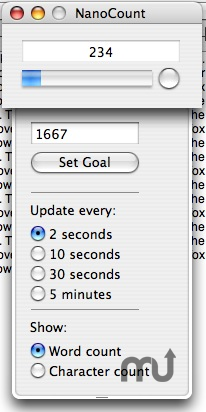
Daily Archives: February 3, 2008
Hot roomy fiasco
Apropos the Microsoft bid for Yahoo, a GMSV reader ran an anagram engine against a combination of Microsoft and Yahoo and came up with these:
Word-count for TextEdit
A writer friend asked me if I could recommend an alternative to Microsoft Word. He’s a Mac user, so I asked him if he’d considered TextEdit, the free word-processing application that comes with the Mac. He hadn’t, so we looked at it. “Has it got word-count?” he asked. We checked, and it doesn’t.

But a few seconds Googling found a neat — and free — little app which watches the current TextEdit window and displays an updated word count as you type. You can download it from here.
Nicholas Carr…
… announces that he’s “thrilled” to be joining the Editorial Advisory Board of Encyclopedia Britannica.
I take it that, in the interests of the objectivity that Carr so prizes and affects to practise, he will henceforth recuse himself from commenting on Wikipedia.
Social networking peaks
From Creative Capital…
I just got a hold of the ComScore numbers for U.S. social networking sites, and it ain’t pretty folks. (See an abridged version of the chart below this post.) After peaking in October of 2007 with 71.9 million users, MySpace, the leading social network, has seen its audience fall back to around 68.9 million unique visitors. December saw no growth over November, though visitors were up 13% from last December.
More alarming are the engagement metrics. Since December 2006, when MySpace engagement peaked at about 234 minutes spent per visitor, time spent on the site has dropped consistently throughout the year. In December, time spent per visitor saw its biggest month-to-month drop, of about 8.5%, to 179 minutes per visitor per month, down from 196 minutes in November. That equates to a 24% year-over-year drop.
But the pain is not just a MySpace problem. It seems to be an industry-wide issue. The total audience of U.S. social networks seems to be stuck at a low-to-mid-single digit growth rate, while the engagment metrics are falling for just about everyone. Time spent on Bebo.com has been sliced in half over the last four months, while Friendster’s time spent has plummeted nearly 75% in the same time period. Overall, minutes spent per site fell 5% in December 2007 compared to the year-ago period….
More in that vein here.
Lilies and fuzzy orchids

A not-entirely-successful attempt (using a 10mm lens) to link the lilies with the Mapplethorpe orchid picture in the background.
So is it really a big deal?
A Newsnight journalist rang me on Friday evening, just after we’d arrived in deepest Suffolk, to see if I’d be interested in coming on the programme to talk about the Microsoft-Yahoo deal. I declined gracefully on the grounds that (a) I like being in deepest Suffolk, and (b) I wasn’t sure the story was such a big deal anyway. Now, it looks as though I’m not alone in thinking that. Here’s John Markoff of the NYT on the subject:
SAN FRANCISCO — In moving to buy Yahoo, Microsoft may be firing the final shot of yesterday’s war.
That one was over Internet search advertising, a booming category in which both Microsoft and Yahoo were humble and distant also-rans behind Google.
Microsoft may see Yahoo as its last best chance to catch up. But for all its size and ambition, the bid has not been greeted with enthusiasm. That may be because Silicon Valley favors bottom-up innovation instead of growth by acquisition. The region’s investment money and brain power are tuned to start-ups that can anticipate the next big thing rather than chase the last one.
And what will touch off the next battle? Maybe it will be a low-power microprocessor, code-named Silverthorne, that Intel plans to announce Monday. It is designed for a new wave of hand-held wireless devices that Silicon Valley hopes will touch off the next wave of software innovation.
Or maybe it will be something else entirely.
No one really knows, of course, but gambling on the future is the essence of Silicon Valley. Everyone chases the next big thing, knowing it could very well be the wrong thing. And those who guess wrong risk their survival….
Update: Newsnight ran a piece with Charles Arthur and Robert Scoble. See it on YouTube here.
Spring morning…

… in a Suffolk garden, yesterday.
More complexity than we can handle
This morning’s Observer column
Those whom the Gods would destroy, they first make clever. That, at any rate, is the conclusion to be drawn from recent ‘systemic failures’, all of which have occurred in systems designed and built by ostensibly very clever people…
On reflection…

… I should have paid more attention to the horizontals.
